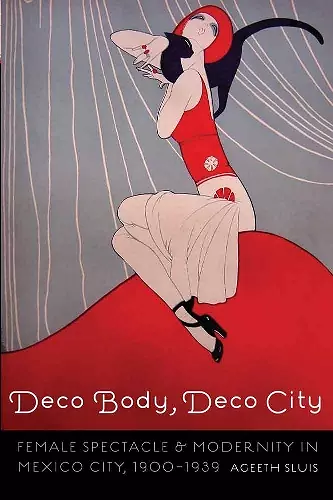Deco Body, Deco City
Female Spectacle and Modernity in Mexico City, 1900–1939
Format:Paperback
Publisher:University of Nebraska Press
Published:1st Jan '16
Currently unavailable, and unfortunately no date known when it will be back

In the turbulent decades following the Mexican Revolution, Mexico City saw a drastic influx of female migrants seeking escape and protection from the ravages of war in the countryside. While some settled in slums and tenements, where the informal economy often provided the only means of survival, the revolution, in the absence of men, also prompted women to take up traditionally male roles, created new jobs in the public sphere open to women, and carved out new social spaces in which women could exercise agency.
In Deco Body, Deco City, Ageeth Sluis explores the effects of changing gender norms on the formation of urban space in Mexico City by linking aesthetic and architectural discourses to political and social developments. Through an analysis of the relationship between female migration to the city and gender performances on and off the stage, the book shows how a new transnational ideal female physique informed the physical shape of the city. By bridging the gap between indigenismo (pride in Mexico’s indigenous heritage) and mestizaje (privileging the ideal of race mixing), this new female deco body paved the way for mestizo modernity. This cultural history enriches our understanding of Mexico’s postrevolutionary decades and brings together social, gender, theater, and architectural history to demonstrate how changing gender norms formed the basis of a new urban modernity.
"Deco Body, Deco City delivers a new lexicon that will undoubtedly become standard in modern Mexican historiography."—Elena Jackson Albarrán, Hispanic American Historical Review
"Deco Body, Deco City is a much needed addition to the existing literature on modern Mexican history."—Washington BookReview
"Deco Body provocatively combines the aesthetic, urban planning, and architecture and suggests new avenues of research that promise to productively expand the field of Mexican cultural history."—Laura Isabel Serna, Pacific Historical Review
"Sluis's study is one of the most original studies of women in Mexican culture since the publication of Jean Franco's Plotting Women in 1989. But while Franco—and other scholars after her, such as Vicky Unruh—have focused on women writers and artists, Sluis turns her eye to a group of women who have for the most part gone unnoticed by cultural historians: popular actresses, vaudeville girls, prostitutes, working-class women, and other female subjects who inhabited the lower tiers of urban culture between 1920 and 1950."—Rubén Gallo, Latin American Research Review
“Ageeth Sluis has opened the history of the Mexican Revolution to the gendered gaze of urbanization, art, theater, and modernity. . . . A fascinating study.”—Donna Guy, emerita professor of history at Ohio State University and author of Sex and Danger in Buenos Aires: Prostitution, Family, and Nation in Argentina
“Deco Body, Deco City offers cutting-edge analysis and a sweeping look at subjects never before studied in twentieth-century Mexican history: markets, opera performers, urban parks, and how women navigated a revolutionary regime.”—James Garza, associate professor of history and ethnic studies at the University of Nebraska–Lincoln and author of The Imagined Underworld: Sex, Crime, and Vice in Porfirian Mexico City
“This is a great book. It enriches our understanding of the postrevolutionary decade and brings together social, gender, theater, and architectural history in the way that only the best cultural historians of Mexico can.”—Victor Macías-González, professor of history and women’s gender, and sexuality studies at the University of Wisconsin–La Crosse
ISBN: 9780803293823
Dimensions: unknown
Weight: unknown
396 pages